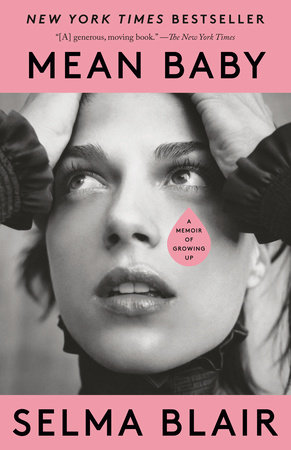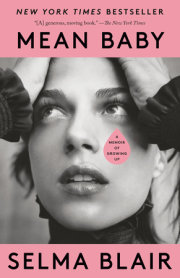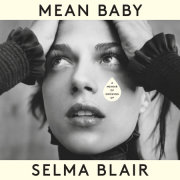Mean BabyI’m not sure how to harness my meandering thoughts into words and sentences that make sense. So I’ll start with what I know.
We are all in search of a story that explains who we are.
As Joan Didion wrote, “We tell ourselves stories in order to live.” We are made not only by the stories we tell ourselves but by the tales of others—the stories they tell us, and the stories they tell about us.
The first story I was told about myself—other than the one about how my mother watched as the doctor pulled me out from her insides—is that I was a mean, mean baby.
I came into this world with my mouth pulled into a perpetual snarl. I was born with a glower, my face defined by a heavy brow that adults coveted. But on a child—an infant, no less—my face looked judgmental, scrutinizing. No one knew quite what to make of it.
When I arrived home from the hospital, only one of my three sisters, Katie, who was five, was waiting in our driveway. Mimi, aged twelve, and Lizzie, almost two, were elsewhere. Katie rushed out to meet me, my mother holding me on her lap. Katie asked if I was a baby doll for her. No, I wasn’t, my expression said. A few days later, some of the neighborhood kids came over to meet the new Beitner child. Within minutes, they left screaming, warning any-one who would listen, “Do not go over there. The Beitners have a mean baby.” Can you imagine! Have you ever heard an infant described in this way? What could I have done? I was just days old! An infant with a snarl. I only wanted someone to pick me up, I think. Or put me down! But instead they all went and gossiped. From the very beginning, I was misunderstood.
Nevertheless, the label stuck, as labels are wont to do. What people call you does matter. The words we use hold weight. We say this sometimes, as lip service, but it’s true. It’s like having a sticker affixed to your back that the rest of the world can read but you can’t. Before I could even speak, I was told who and what I was. I was mean.
In my defense, I did not have a proper name for the first few years of my life. My birth certificate reads, simply, “Baby Girl Beit-ner.” In babyhood, I was given the nickname Baby Bear. My mom said they called me Bear because I had such a furry head that they would have to rub it to make way for my forehead. (I used to feel bad about this bit of my history, until I read that Rene Russo was born with the same affliction.)
Eventually, my family started calling me Blair—after Blair Moody, my mother told me. A U.S. senator and circuit court judge from Michigan whom she admired. This was funny, because I was so moody. (To this I say: Be careful what you name your kid!) I remember being a Blair, because they would all spell it out when-ever they talked about me, as though I wouldn’t piece it together. “B- L- A- I- R was mean,” or “B- L- A- I- R wants to come.”
This continued until I was three, when I went to preschool and needed a legal name. My mother decided to name me Selma, after her much-adored friend who died around the time I was born. In the Jewish tradition, babies are never named after a living person, and this seemed like a fitting tribute. The other names in conten-tion were Ethel, Gretel—which I would have liked—Marta, Mar-tha, and Gwyneth. (Gwyneth! To think, I could have been one, too!) There came a point where I loudly proclaimed, “When am I going to get one of those names?” referring to my sisters’ nick-names of Ducky, Precious, and Princess. I wanted a pretty name. But it was not to be. From this point forward, I was Selma Blaire Bear Beitner, though my mother eventually removed the e from “Blaire,” because she said it was “too pretentious.” And there you have it.
For my entire life, I have been both. Selma and Blair. My two names would come to define me, as much as the stories around them.
As a child, I never took to the name Selma. It seemed to me an old lady’s name, not a name befitting a little girl. When given a choice, I always asked to be called Blair, but I got a real boatload of “Selma” in elementary school. Whenever the teacher did roll call, I was too shy to ask, “Can you call me Blair?” So all day long I was Selma, or Bat Sheva, the Hebrew name used by the teachers at my Jewish day school, and at home I was Blair. Mom was always sorry I didn’t like Selma. A feminine of Saint Anselm, the Benedictine monk. Or a reference to Selma, Alabama. It was a good name, she often reminded me.
When I was five years old, Mom, Dad, and I went on a weekend trip where I struck up a friendship with a family with a baby. As we lounged poolside, the mother asked my name, and I casually replied that it was Lisa—a nice, normal name. As Lisa, I played with that baby for three hours, helping her navigate the hotel pool in her floaties. When the afternoon sun sank low in the sky, the woman approached my mother and told her that her daughter Lisa had been so helpful.
“Lisa!” My mother let out a wail. “Her name’s not Lisa! What a crock! What a liar!”
The woman looked at me as though she were seeing me for the first time. My lovely afternoon had been erased. I was no longer Lisa, and now I was a liar as well.
My mother nicknamed me Saintly, but it was tongue in cheek. I was no saint. I could sometimes be saintly to my mother, but to everyone else I was a mean baby.
Growing up, I shared a bedroom with my sister Lizzie, since we were closest in age. Our parents let us choose the wallpaper, and since Lizzie didn’t care, I picked a pattern with little pink and blue flowers floating against white. I chose it because it looked similar to what Jessica Lange describes as her childhood wallpaper in the movie Tootsie. Movies, even then, were what gave me ideas and hope.
Our room had two twin beds and those vinyl shades you needed to tug in order to pull them up or down. Every morning, I got out of bed very, very quickly. I had never been one to linger. (Can you believe it?) I rushed to pull the shade down, so it would snap to attention and rip-roll up loudly, sending the diffused morning sun straight into Lizzie’s eyes.
“Yehi or!” I’d yell at the top of my lungs, quoting from the first lines of Genesis, the Hebrew words for “Let there be light!”
“Blair!” she would croak, rubbing her eyes. “Why do you do this?”
Next I made my way around the room, throwing open the door, turning on the television atop Mom’s childhood maple dresser, her mother’s before her, and flicking on the lights. I needed life, imme-diately. I needed every bit of everything, every bit of help, anything I could reach in order to cheerlead myself into embracing my day. Even then, I did this.
This was how our days began. I made Lizzie crazy. But she put up with me. Every night, we said good night back and forth until one of us fell asleep. She was always there with me.
Copyright © 2022 by Selma Blair. All rights reserved. No part of this excerpt may be reproduced or reprinted without permission in writing from the publisher.










